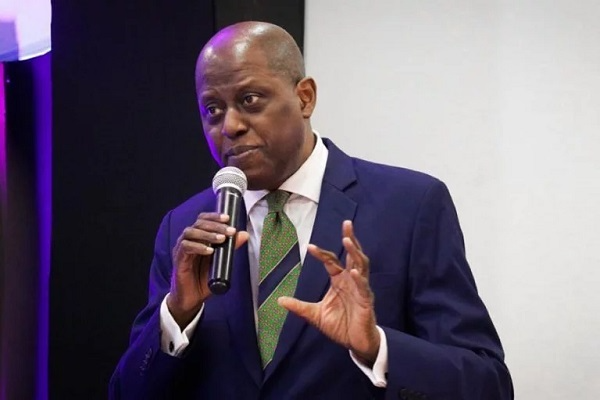…to assume Chair G24 Intergovernmental Group, Nov 1
Washington DC || Olayemi Cardoso, governor, Central Bank of Nigeria (CBN), said on friday that the country’s economic reform agenda is delivering tangible results, with inflation easing, the naira stabilising, and investor confidence gradually returning.
Speaking to Nigerian journalists at the end of the IMF and World Bank Annual Meetings in Washington D.C., Cardoso also revealed that the CBN is leveraging artificial intelligence and advanced analytics to modernise monetary policy and strengthen decision-making.
“There is broad recognition that Nigeria’s reforms are delivering results,” Cardoso said. “Inflation is moderating, the exchange rate has stabilised, and investor confidence is returning.” He added that the recent decline in headline inflation to 18.02% in September, down from 20.12% in August, marked the sixth consecutive monthly drop and the lowest level in three years.
The governor attributed this trend to tighter monetary conditions, improved exchange rate management, and greater market transparency.
He said the naira has continued to appreciate, with the gap between the official and parallel market rates narrowing to less than 2%. Nigeria’s foreign reserves, meanwhile, have risen to over $43 billion, covering more than 11 months of imports, boosted by rising inflows and renewed investor participation across multiple asset classes.
Cardoso emphasised the restoration of monetary policy orthodoxy at the central bank, relying on traditional tools such as the monetary policy rate, cash reserve requirements, and liquidity ratios to anchor inflation expectations and manage liquidity.
He said those measures, in combination with improved coordination with fiscal authorities, are helping to deliver “tangible outcomes.”
As part of its evolving policy framework, the CBN is adopting new technologies to enhance macroeconomic forecasting and decision-making. “Advanced analytics and AI are being leveraged to strengthen monetary operations, enhance forecasting, and improve policy transmission, ensuring decisions are data-driven and forward-looking,” he said.
The broader economic reform drive has included the removal of fuel subsidies, increased revenue mobilisation, and efforts to trim government spending while directing resources toward priority areas like infrastructure, education, and healthcare.
Cardoso noted that public finances are improving, supported by non-oil revenue growth and a rebound in oil production in previously insecure areas. He said over $8 billion in new energy investments have been attracted in the last year.
Nigeria’s financial system, he added, is on a firmer footing. The bank recapitalisation program is advancing, with the aim of creating a stronger and more globally competitive banking sector. In the foreign exchange market, recent reforms have improved efficiency and supported disinflation, while food supply conditions and petroleum product prices continue to stabilise.
Cardoso also pointed to Nigeria’s growing leadership in global economic forums.
Nigeria will formally assume the chairmanship of the Intergovernmental Group of 24 on November 1, succeeding Argentina. The G-24 represents the interests of developing countries within the Bretton Woods system. “This milestone underscores international confidence in Nigeria’s leadership and our growing influence in shaping the global financial architecture,” Cardoso said.
Beyond high-level meetings, Nigeria also held investor engagements in Washington, including a dedicated forum that brought together global financial institutions and private sector leaders. Discussions with ratings agencies, the IMF, World Bank, and other central banks reinforced investor trust in the country’s policy direction and reform trajectory.
Read also: Nigeria, Angola Central Banks sign MoU to deepen bilateral technical cooperation
The CBN also met with Nigerian fintech leaders during the week to explore the future of digital finance. “We believe that innovation and regulation must progress together, anchored in trust and responsible growth,” Cardoso said, describing fintech firms as “ambassadors of our nation’s creativity and resilience.”
Nigeria, he said, remains committed to strengthening macroeconomic fundamentals, advancing reform, and building an inclusive and innovative economy.
“Our story is one of resilience, of a nation aligning courage with conviction to build a more competitive, innovative, and inclusive economy.”

